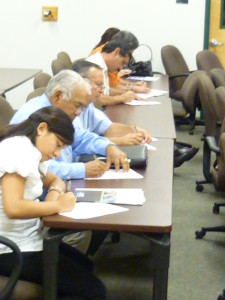We have much more to do and your continued support is needed now more than ever.
Five Lessons for Boosting Career Skills in a Clean Energy Economy

1. Community College Instructors are Influential in Determining Whether the U.S. will Lead in the World Clean Economy by Preparing Students with the Necessary Knowledge and Skills:
A national Greenforce survey of a small sample of community college educators found that instructors are having a far-reaching impact on US workforce readiness for a greener economy. Over fewer than four years, 300 career and technical instructors at a small sample of 51 community colleges had modified 500 or more training and skill development courses serving more than 10,000 students. Examples include courses on advanced energy storage, clean fuel vehicle technology, architecture, agriculture, forestry, pre-engineering and wastewater.
2. Professional Development for Community College Instructors Goes Hand in Hand with Educating Students and is a Top U.S. Priority:
The Greenforce survey found that faculty are obtaining new sustainability credentials such as BPI, NABCEP or LEED to assess these career development opportunities for their students. For example, Dan Smith, an instructor at Clover Park Technical College (CPTC) in Washington obtained the BPI credential which, in turn, assisted him in developing an indoor air quality module that has now been incorporated into several courses. However, an earlier survey indicates that only a minority (36%) of two and four-year colleges and universities have programs to support faculty professional development on environment or sustainability topics. Greenforce survey respondents cited additional continued professional development as important to their continued ability to prepare their students with sustainability skills.
3. Enhancing Existing Community College Courses is More Important than Developing New Courses When it Comes to Preparing the U.S. Workforce for Productive Roles in a Clean Economy:
Faculty more frequently cited the need to adapt existing courses than to develop new specialty courses on sustainability. Instead of creating a new class on sustainability at South Texas College, for example, instructors developed new material around environmental impacts of business decisions and more cost-effective approaches for the existing introductory course of business decisions required of all students in the business school (Business Principles, BUSI-1301). Faculty cite similar adaptations across dozens of disciplines from engineering and finance to transportation.
4. College Leaders Need Employers to Partner In Re-Tooling Courses and this Will Require More Support and Incentives for Employers:
Community college faculty also report they are working concertedly to build relationships with employers, assess employers’ needs and introduce students to employers. Together with the Greenforce Initiative, instructors engaged employers in myriad ways. For example, they coordinated on-line meetings with energy efficiency employers in Texas; identified HVAC contractors in Virginia that are shifting to more efficient motors and ground source heat pumps; researched businesses around the Detroit area willing to help develop course segments on solar photovoltaic and solar thermal; built out a green economy website at College of Lake County in Illinois featuring employers and products; hosted sustainability career fairs and recruited employers for advisory boards.
More than 200 employers engaged in the national Greenforce Initiative over its initial four years ranged from Franktronics in Virginia to Northwest Hospital in Washington and Tecta America in Illinois to GM in Michigan. Frequently, employers emphasized the need for students with sustainability systems skills and, yet, it was often noted that, in order for employers to be able to afford to co-teach courses, articulate and share more precise sustainability skills needs and jobs opportunities, consult on hands-on projects, provide apprenticeships, etc. employers would need supportive incentives and other programming. The campus and clean economy partnerships hold great promise. Dan Guinn, of Dan Guinn Homes and GCI Energy Consultants, VA, for example, explained:
“We have had good response to our participation in programs like the green vendor fair and summit at Rappahannock Community College. Mainly our focus has been on greater awareness in the community. I believe that we have been able to help people to understand what products and services are available to them through our local businesses. We have had some interest as well in course studies for the community college relating to Energy Efficiency.”
5. Hands-On Projects Help Bring it all Together: Instructors, Employers, Students and Skills:
One of the approaches faculty commonly used, according to surveys and case studies, was to provide a hands-on or experiential component to adapted courses. From a mobile solar thermal demonstration project for the HVAC classes at Nash Community College in North Carolina, to a photovoltaic motorcycle container project involving multiple disciplines at Thomas Nelson Community College in Virginia and a large-scale community weatherization project at Lansing Community College in Michigan, faculty organized dozens of hands-on projects with support from the Greenforce Initiative to advance skills and career connections for students. The projects connected the classroom with the business and operational practices of the campuses and wider communities and lead to greater student awareness. For example: Brittany Sparks, a student in Dabney S. Lancaster Community College, VA, took classes in the wind turbine technician program as part of her degree coursework through the Forestry Department, explaining:
“I saw that as a wonderful opportunity to get hands-on experience and see the different ways this knowledge can be used. Having a certificate or degree from the wind program doesn’t mean that is what you have to specifically do. There are so many skills that you learn, that you can branch out, do many different things with the knowledge and see the different applications.”
Evan Foster, earned his degree in energy management system and a certificate in energy auditing from Lansing Community College in 2012, where he says that the hands on experience he gained set him apart when applying for later job as the student assistant to the Director of Utilities and Energy Management Systems at Wayne State University. As a student, Evan conducted three residential energy audits and two commercial energy audits as part of his course requirements. He also gained experience with lighting retrofits, which was one of the first projects he took on at his new job. A video illustrates his experience. Karla Pirko, a second year student in the Environmental Science Technology Program at Southeastern Community College, enhanced her Major in Agricultural Biotechnology with an internship focused on developing a native plant rain garden at the college which, she explained,
“Provided us a way to filter runoff, to conserve water, improve our water quality, and created a habitat for the birds and butterflies since we are using native plants; plus it has given us a hands on experience to learn more about our watershed and how we can improve it in our daily tasks.”
Looking Ahead in 2014 and Beyond: Four initiatives will help seize the opportunities community college instructors identified in the Greenforce survey, ranging from new on-line professional development opportunities to a global initiative to spotlight the importance of sustainability skills education. For example, the Greenforce Initiative and partners will launch over the next two years, four new initiatives, including:
- Sustainability Skills and Demand Courses: The Greenforce Initiative (along with association partners such as the American Association of Community College and U.S. Green Building Council and foundation partners such as the Bank of America Charitable Foundation and others) is working with leading community college instructors to develop a suite of faculty professional development opportunities, including regional and national webinars, toolkits and on-line courses.
- Broader Survey on Climate Change Science and Solutions and Instructors Response: As part of the release of the IPCC’s fifth assessment report and the next round of UN Climate Talks, NWF is working with partners to disseminate a nine-question national survey to leading faculty across disciplines at both two and four-year colleges and universities on trends in current or planned shifts in educational strategies for students. The findings will be rolled up and shared nationally to help spotlight the importance of education in US and global climate action planning, to identify models that can be highlighted as well as areas of opportunity.
- NASA Climate Change Solutions Education: A partnership with NASA and three flagship community colleges (Edgecomb Community College, NC; Wilbur Wright Community College, Chicago, Illinois; and Wayne County Community College in Detroit, Michigan) will enhance the new on-line clean economy professional development courses for community college instructors. More than a dozen faculty across disciplines ranging from chemistry to geographical and biological sciences have spent nearly three academic years tapping NASA earth observing satellite data and resources such as David Blockstein’s textbook, Climate Solutions, to help make their courses relevant in an era of land and energy use patterns that are increasing concentrations of greenhouse gases in the atmosphere and altering the earth’s climate. Faculty have created modules on symptoms such as ocean acidification and rising sea levels in specific local coastal communities, while engaging their students in researching local trends and solutions and investigating how careers are changing in everything from the insurance to energy. The current effort is to wrap-up and share lessons learned as part of a the various national professional development initiatives with faculty described here.
- A National Policy and Systems Change Agenda: Ultimately, to prepare a workforce with the sustainability skills increasingly in demand by employers and their consumers, professional development for community college instructors and related efforts to advance sustainability skills education will need to become a much higher priority on the US and global policy agenda. Accordingly, the Greenforce Initiative convened national thought leaders in spring 2013 and hosted a series of subsequent working groups to create a policy and systems agenda for advancing sustainability skills nationally, including recommendations for key stakeholders, including the President, Congress, State and city leaders, employers, NGOs and students. The policy guidelines will be released and disseminated in fall of 2014 and beyond. Contact the Greenforce Initiative for more information.





















